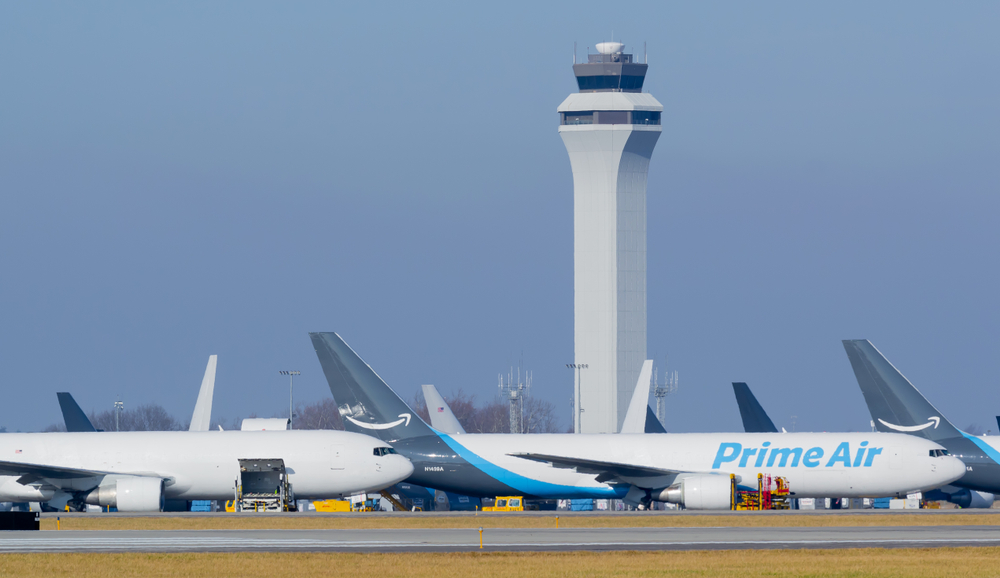With Amazon’s recent forays into air freight shipping, businesses need experienced logistics providers to navigate an increasingly volatile e-commerce landscape.
For anyone paying attention to the shipping and logistics industry, Amazon’s disruptive tactics are old news. From designing its own payment platform to breaking into the IT space as a cloud provider, the online marketplace has emerged as a competitor in a range of fields. It should come as no surprise then that Jeff Bezos’s e-commerce juggernaut is expanding into air freight with its own fleet of aircraft and a growing footprint of air freight hubs.
In fact, Amazon recently began construction on a new air freight hub at Fort Worth’s Alliance Airport. The move signals a continued interest on the part of Amazon in vertical integration initiatives. With more than 100 million Prime Members expecting two-day shipping at no additional cost beyond their regular annual fee, bringing air freight capacity in-house makes sense.
E-commerce retailers should take note of this expansion — as should potential competitors like FedEx and UPS. However, while Amazon looks to bolster its shipping program, it’s important for online merchants to understand why relying on Amazon’s internal logistics offerings isn’t always the best move. Instead, many e-commerce retailers will find that experienced logistics providers can offer reliable service at a more competitive price.
Another Air Freight Hub for Amazon Air
The new air freight hub at Fort Worth’s Alliance Airport will join previously announced facilities at Chicago Rockford International Airport and Cincinnati/Northern Kentucky International Airport, with the Cincinnati location acting as the main Amazon Air hub. All three facilities will support Amazon’s regional distribution efforts in expanding markets for its e-commerce operation.
Amazon’s investment in Alliance Airport represents a new phase for the facility, which has acted as an industrial and air freight hub for the past several decades. This means that Amazon’s presence will dovetail with existing infrastructure while still allowing room for growth tailored to the e-commerce giant’s specific plans.
Alliance Airport also offers other benefits for Amazon Air. The airport has its own FAA air traffic control tower, US Customs and Border Protections screening facilities, and — because of its focus on air freight — eliminates the common problem of sharing runways with passenger planes that disrupt priority shipping.
Why Amazon Fulfillment Isn’t For Everyone
Experts have pointed out the threat Amazon Air may pose to FedEx and UPS, but the two shipping companies have stated that they aren’t worried. During a second-quarter earnings call, FedEx CEO Frederick Smith said that “We don’t see [Amazon Air] as a peer competitor at this point in time.”
While established shipping companies will likely keep an eye on Amazon Air, this stance makes sense. Just because Amazon offers fulfillment services that online merchants need doesn’t mean that it offers those services in a way that offers businesses a good bang for their buck.
For example, selling with the online marketplace through Fulfillment by Amazon (FBA) comes with disadvantages that budding e-commerce retailers need to consider. Amazon’s fulfillment and storage fees cover picking, packing, and shipping orders, customer service, returns, and monthly storage for remaining inventory. However, those costs can change dramatically throughout the year — and at Amazon’s discretion.
What’s more, businesses that rely on increasingly popular multi-channel fulfillment may find themselves priced out of FBA. For instance, two-day shipping on small products can cost nearly $8.00 for single-item orders. Of course, it’s up to businesses to analyze what makes sense for their supply chain, but these pricing levels go to show how over-reliance on Amazon can cost you.
Opportunities for Shippers and Logistics Providers
Now more than ever, businesses need to know how to navigate an increasingly volatile shipping and logistics landscape. Amazon does offer fulfillment services, but you need to be sure you’re driving value for your operation while serving your customers well in an ever-changing industry.
While large businesses might have the resources to handle their supply chains on their own, small and mid-sized businesses often don’t — and that’s why some turn to Amazon for infrastructure and support. However, by working with independent third-party logistics (3PL) partners or integrated logistics services providers (ISPs), it’s possible to manage your supply chain efficiently and stay in control of the process without handing over the keys to Amazon.
With over two decades of experience, Primary Freight is a trusted name in the shipping and logistics industry. Whether you’re looking to revamp your supply chain or make a few improvements, our award-winning team can help. Get the conversation started today by reaching out and letting us know what support we can provide for your business.
If you’d like to learn more about how Primary Freight’s award-winning shipping services, contact us today at (800)-635-0013.
